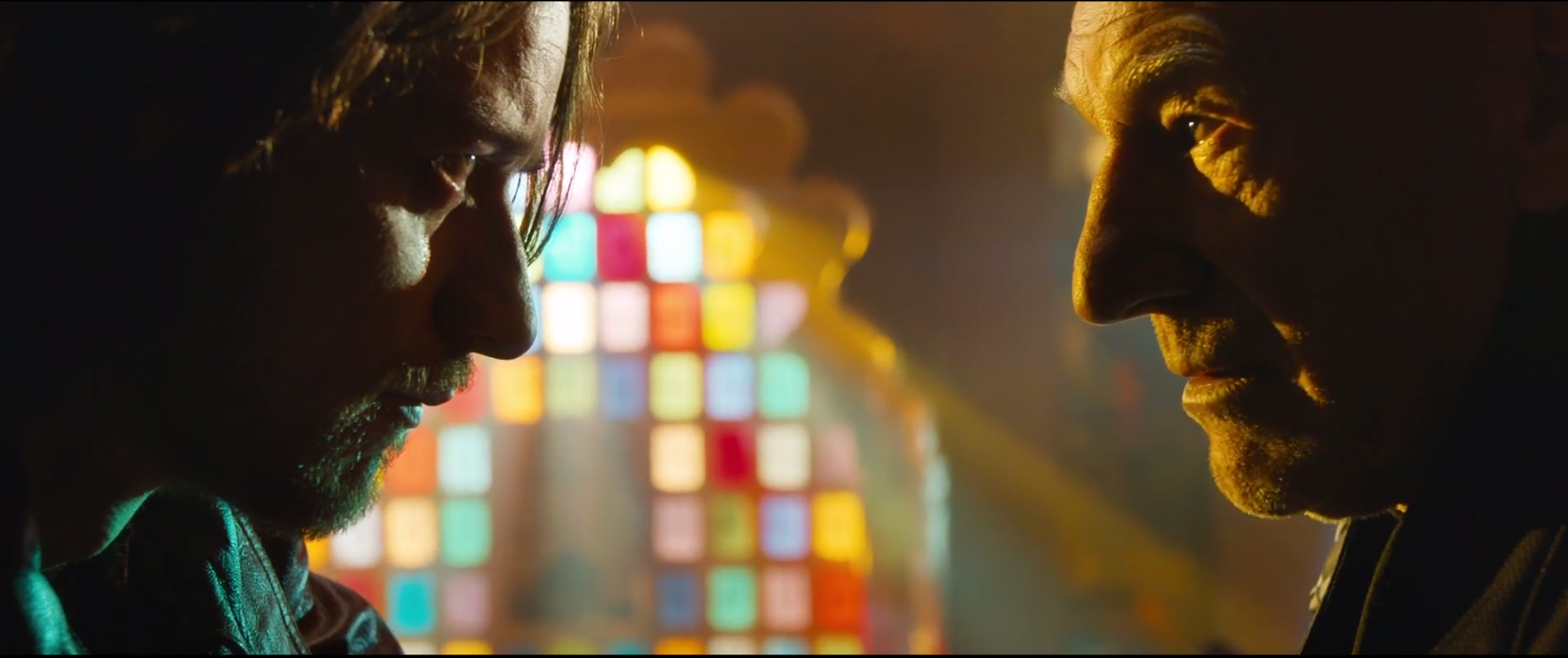In a cinematic landscape full of superheroes that have been completely rebooted, the X-Men franchise is the only example of a film series clinging to the past style of filmmaking. Despite having a semi-revamp in the form of the recent films First Class, Days of Future Past and this past weekend’s Apocalypse, a few of the earlier cast members (namely Hugh Jackman as Wolverine) still remain a consistent lingering factor. Even as the MCU started gaining the rights to characters Marvel ended up selling off in the 1980s and 90s to avoid bankruptcy, X-Men remained the one property out of their safe hands and in Fox’s… careless ones, shall we say? Then again, I’m not really here to debate much on comic adaptation, given my limited experience in the franchise’s original sources beyond Joss Wheadon’s run and some Deadpool comics. This is more about the films themselves and their consistency – or lack there of – for me.
The first X-Men is an incredibly important film for its place culturally. Without it and the previous superhero hit Blade, we probably wouldn’t have the superhero explosion of our modern era, love it or hate it. Hell, future MCU head honcho Kevin Feige’s first producer credit is on 2000’s X-Men and it’s easy to see that Feige took some notes from how director Bryan Singer managed to juggle the multitude of cast members here that would prepare him for The Avengers and Captain America: Civil War. That being said, the extension of the X-Men franchise following The Last Stand and Origins: Wolverine is questionable, given the reboot ideal behind casting Michael Fassbender and James McAvoy shows the lack of care Fox put into continuity, for both better… and worse? Given the uneven nature of the frahnchise, it’s clear that the X-Men franchise won’t fully fit into the usual structure of I’m All Out of Love as concretely, but we’ll get into that.
The Spark
One can see how Bryan Singer took influence from his producer on the first film Richard Donner’s Superman films, making the original X-Men effort a grounded real world attempt at establishing these heroes. The first half of the film shows this off perfectly, nailing the conflict between mutant kind and humans with the right amount of blatant yet endearing visual storytelling. A Jewish boy trying desperately to move the metal bars of a concentration camp gate with his mind as his parents are hauled away. Wolverine getting his meager living fighting for scraps in a cage match. Magneto forcing the mutant abilities upon the very senator who is trying to out them. The major characters are well established, mainly Hugh Jackman’s wise ass loner take on Wolverine, Patrick Stewart’s compassionate Professor Xavier who strives valiantly for embracing human/mutant relations and Ian McKellan’s authoritative demeanor that rages as the dangerously pro-mutant Magneto. The first would be the unofficial mascot fo the series and would appear in every single entry, while the latter two would serve as the major pillars of the X-Men series’ strongly conflicting morals.
The other characters… wouldn’t have as strong an impact. Even upon an initial viewing, characters like Storm, Cyclops and Jean Grey didn’t really stick with me. Maybe that had to do with the rather wooden performances of Halle Berry, James Marsden & Famke Jansen, who seemed to carry a school of thought that “it’s a serious comic book movie, so I should just sort of stare blankly.” After all, in the post Matrix/Batman & Robin world of comic book films, the yellow spandex of the comics is literally called out as “silly”, as darker hued leather equaled “more believable” at the time. Singer carried this over into the lighting here, which is constantly covered in shadows and darkness to attempt a naturalistic feeling that mostly just obscures the characters. It’s an aesthetic that worked then, but doesn’t age very well as it culminates in one of the least engaging action climaxes in superhero film history. One that basically created the “giant-light-beaming-in-the-sky” cliche that would hit full force within a decade or so and features actors doing plenty of “bad constipation face.” Still, the initial X-Men accomplished its main goal of showing that these characters could be brought to the big screen and that the dynamic could be treated seriously. As a child, I didn’t even think a superhero film could do such a thing. For that much, it’s a decent stepping stone in film history that would only be improved by those in its wake… including the sequels to follow.
The Love Affair
As I said before, we’re going to skip around a few places here and there. While things get rocky in the fifteen or so period year where X-Men turned from a single proof of concept film to a franchise, the stand outs are clear and wonderful examples of how to balance the fun of superheroes with an honest crux of emotionality from a large cast. In X2, there’s so much improvement from Singer’s action direction and lighting, allowing for far more diverse moods and character moments to transpire during bigger scenes. Nightcrawler during the wonderful opening White House chase and Magneto’s siphoning of iron from a security guard’s blood are just two excellent highmarks. They’re character moments that build on the mutant vs humanity concept and give true perspective into these character’s motives while still being visually impressive. The crux of the story being around Wolverine works here, as his confrontations with Brian Cox’s Stryker are filled with righteous tension and authentic human emotion that was missing from the first film. It’s the type of loner attitude for Hugh Jackman’s Wolverine that would only really be somewhat accomplished again by The Wolverine… well, at least the first two thirds of The Wolverine. The ending in the Oval Office is such an incredible set up for the type of potential progress of human/mutant relations that utilizes Singer’s darker aesthetic wonderfully. While things like the Cyclops and Jean Grey development aren’t that improved by X2, it ages far better than most superhero films of its time.
However, I’d still say that entry isn’t quite as ultimately satisfying and entertaining as the double whammy of the semi-reboots First Class and Days of Future Past. After the awfulness that was in between (which we’ll get to), I didn’t have much of any hope for a younger X-Men cast being much of an improvement. Yet, Matthew Vaughn managed to add a more loose fun sense of style with a 1960s era design that brought some life to a series that had been stuck on one aesthetic for roughly a decade. The choice of decade not only mirrors the time period the X-Men were created in, but also feeds into the struggles of these mutant characters given the era of Civl Rights and Cold War conflict. The same can be said for Days of Future Past, but with the setting of a paranoia fueled 1973 that’s in clear disillusion post-Vietnam serving as a mirror to the detracted optimism of our heroes. The central relationship between Magneto and Professor X is also built up perfectly here, allowing time to know these men at their separate highs and lows as a former concentration camp refugee on the hunt for Nazis and a fresh faced scholar off to spread knowledge about the matters of mutation respectively. The chemistry between Michael Fassbender and James McAvoy feels authentic, spreading to the other members of First Class as they believably have tension yet grow a bond that makes their Bay of Pigs-style confrontation in First Class all the more engaging and their disbanding/multiple deadly take outs in Days of Future Past all the more upsetting, particularly when compared to McKellan and Stewart struggle to keep the future alive in Days of Future Past. Caught in the middle is a much more nuanced version of Mystique than the original trilogy’s in the form of Jennifer Lawrence grappling between Magneto and Xavier’s methods as she adjusts to a society that would shun her for her primary form. Add in stand out sequences like Quicksilver’s Pentagon raid in Past or Magneto’s bar interrogation in First Class and you have a duology that could almost serve as an end to this universe… if only.
Nothing Lasts Forever
We’re all aware of how this love affair went up in flames the first time. The X-Men: The Last Stand had all the potential to follow up the groundwork of the first two films with a grand explosive trilogy ender that saw our heroes come to blows against each other as The Phoenix rose. Maybe certain lacking elements like Cyclops or Wolverine & Jean Grey’s chemistry could be fixed? No, instead we’ll just lay waste to the potential and run through this story so quickly that it feels like director Brett Ratner filmed the script on a double fast forward setting of a VCR. That’s the trouble with The Last Stand; there’s so many interesting ideas and set ups that are glossed over by a desire to just sort of get things over with. They even introduce intriguing elements like Rogue struggling over getting the cure or Kelsey Grammar adding the exact right gravitas as Beast. Hell, even Magneto building his mutant army could have worked if the army itself wasn’t so flat and generic. Meanwhile, there’s not much to say about Origins: Wolverine that hasn’t been said already. It feels more like a Steven Segal-style action picture than it does an X-Men story, with a former badass trying to stay out of public view in the Canadian woods before his girl dies and sends him on a rage. Add in pointless cameos that get characters incredibly wrong, poorly rendered CG and Sabertooth’s godawful straight-to-video level one liners (“Look what the cat dragged in”) and you’ve got a movie so bad I’m surprised its sudo sequel The Wolverine was as tolerable as it was. Clearly, the relationship was bumpy between myself and the X-Men franchise.
But the reboot happened and we sort of fell for each other again… until we didn’t. If our first big fight was clearly X-Men: The Last Stand and our first break was Origins: Wolverine, X-Men Apocalypse was the real deal “I’m done, it’s over” statement. Apocalypse is about as generically awful as a modern superhero movie gets and plays out like a bad cover of an awesome band’s greatest hits. All of the big points of the previous movies are redone here with a much less interesting context, from Cerebro seriously hitting Xavier to Quicksilver having his big drum solo of a time slowing sequence to a big dumb climax that basically boils down to Apocalypse being defeated by “The Power of Friendship.” While The Last Stand had more shaky ground to build on, Apocalypse had two home runs to follow up, one of which done by the same director. Instead, it coasted on what worked and just ran with the most generic fan service bait. Plus, at least The Last Stand moves at such a rapid pace that it gets over quicker. Apocalypse is about forty minutes longer and you can feel EVERY second. This relationship didn’t fizzle; it gained and lost carbonation, sometimes in a very high amount before a steep drop in the case of the last two entries. Can’t keep belting the same song, Singer. People get bored. I got bored. It seemed as if Singer had no idea what to do and just recycled everything from the previous X-films, signifying that this series was running out of ideas to the point where I really don’t want to see another entry in this current universe.
Final Thoughts
Bryan Singer’s X-Men films have a reasonable place in film history. One can’t deny him that and he deserves a solid bill of credit for it. He even deserves credit for helping revive the series along with Matthew Vaughn, allowing for fun and more risky versions of these characters that couldn’t be down a decade before. But he also deserves credit for dragging that franchise out to its slow eventual screaming death. In the sixteen years between his first X-Men film and Apocalypse, we’ve seen just how expansive and complex the comic book movie has become. Not only has Marvel been building their universe, but DC has had their Dark Knight trilogy that brought how serious a comic book adaptation could be & multiple attempts at building an interconnected universe that – while many could argue how well it worked – were at least trying to do something different. Hell, Deadpool skewered most of the stuff Apocalypse treats deadly serious, with the former’s even higher opening weekend showing more of a desire for something outside of the norm from the general public. Shame Singer decided to just regurgitate rather than innovate.
While I’m aware that we’re getting a final Wolverine movie for Hugh Jackman in March of next year, I really do hope this crop of X-Men films is done with. The once fresh series has grown so stale and a fresh pair of hands could craft the type of X-Men movie that actually uses some of the lesser known characters and doesn’t rely on the same pieces of iconography over and over and over again. Plus, I really don’t want to see how lazily the filmmakers slap references to the 1990s all over the place, particularly after the astonishingly bankrupt the cleverness of any of the 1980s references were in Apocalypse. Singer’s style has kept this series back in places, but never quite as much as it has here. Hopefully, either Fox can find the right person to retool the franchise for them or the Marvel Cinematic Universe can take a crack at adapting some of these characters into their thriving and diverse world. Or Fox could make the lesser move and just have the X-Men not age another ten years while wearing Nirvana shirts. Wouldn’t be out of character for them.
Interested in picking up some of the titles mentioned in the article? Please use our Amazon links to do so!









